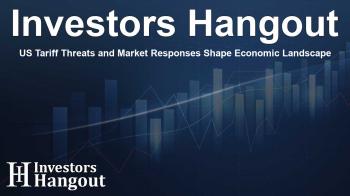US Tariff Threats and Market Responses Shape Economic Landscape

US Tariff Threats Impact Markets and Relations
Recent news has highlighted the US government's decision to impose tariffs on Brazil and smaller trading partners, sending ripples through global markets. Former President Trump announced a fresh round of tariffs, threatening a staggering 50% duty on imports from Brazil. Despite these tensions, the market response has been notably muted.
Trade Talks and Negotiations Under Pressure
The US initially set a deadline for tariffs that has since passed without concrete agreements, leaving trade relations hanging in the balance. The European Union is actively working to finalize a deal focused on vehicle tariffs, an essential sector for the bloc. Meanwhile, Japan is pushing for negotiations with US Treasury officials to break the stalemate in trade discussions. However, the outlook for India seems increasingly bleak following Trump's recent outbursts against the BRICS nations, of which India is a member.
Sector tariffs have resurfaced as a point of contention, especially with the President's announcement regarding the 50% tariffs on copper imports set to take effect soon. This drastic move against Brazil is surprising, considering the existing trade surplus enjoyed by the US with the South American nation.
Brazil's Trade Relations at Risk
Trump's tariffs on Brazil appear to be rooted more in political grievances than trade metrics. He has publicly pressured Brazil's President Luiz Inacio Lula da Silva to cease investigations against former President Jair Bolsonaro, whom Trump refers to as a close ally. This interpersonal conflict may significantly impact Brazil's economy, with the President promising to retaliate against the proposed tariffs.
Other countries affected by the new tariffs include Iraq, Libya, Algeria, and Sri Lanka, facing 30% duties, while Brunei and Moldova contend with 25% levies. The Philippines will experience 20% tariffs, all commencing from the same date as Brazil's. The broad spectrum of these tariffs reflects Trump's aggressive trade stance.
Market Reactions and Investor Sentiment
Despite the impending tariffs, the overall market stayed relatively strong, with only minor fluctuations observed in Brazil's financial indices. The Brazilian real dropped more than 2%, and the benchmark stock index decreased by 1.3%. Investors are showing cautious optimism, signaling belief in potential negotiations resulting in less aggressive trade barriers with major partners such as the EU and Japan.
Wall Street demonstrated resilience in the face of tariffs, with the Nasdaq Composite even reaching an all-time high. Meanwhile, Nividia has shown unprecedented growth, crossing the $4 trillion market cap, indicating that tech stocks remain robust amidst uncertainty.
Dollar's Stability Amid Economic Changes
In the backdrop of these developments, the US dollar has held steady, nearing two-week highs against a selection of currencies. Recent minutes from the Federal Reserve indicated a more conservative approach, dismissing prior expectations for a July rate cut. This stability in the dollar is attributed to a general consensus among Fed officials regarding future policy easing.
Amid all this uncertainty, Bitcoin has gained momentum, aspiring to break the $112,000 mark recently. This increase is attributed to strong institutional interest and favorable conditions fostered by movements in the traditional markets. Hitting this psychological threshold is crucial for sustaining Bitcoin's bullish trend as market participants closely monitor its performance.
Conclusion: The Road Ahead for US Trade and Markets
As the dynamics of trade relationships evolve, the implications for global markets become increasingly complex. The ongoing tension between the US and Brazil over tariffs underscores potential for broader implications on international trade policy. Investors remain alert, balancing optimism over market recoveries against the unpredictability of trade negotiations and political dealings.
Frequently Asked Questions
What recent tariffs has the US government imposed?
The US government has announced a 50% tariff threat on imports from Brazil, along with significant duties on several smaller trading partners.
How have markets reacted to the tariff announcements?
Immediate market reactions were muted, with slight fluctuations in Brazil's currency and stock indices, but Wall Street showed resilience, reaching all-time highs.
What are the broader implications of the tariffs on US-Brazil relations?
The tariffs suggest a shift away from purely economic considerations, as political issues between the US and Brazil influence trade relations.
How is Bitcoin performing amidst the current trade tensions?
Bitcoin is aiming to break past the $112,000 level, influenced by strong institutional demand and overall positive sentiment in traditional markets.
What is the outlook for the US dollar in the current economic climate?
Currently, the US dollar remains stable, near two-week highs, with Fed officials leaning towards a cautious approach regarding future monetary policy changes.
About The Author
Contact Lucas Young privately here. Or send an email with ATTN: Lucas Young as the subject to contact@investorshangout.com.
About Investors Hangout
Investors Hangout is a leading online stock forum for financial discussion and learning, offering a wide range of free tools and resources. It draws in traders of all levels, who exchange market knowledge, investigate trading tactics, and keep an eye on industry developments in real time. Featuring financial articles, stock message boards, quotes, charts, company profiles, and live news updates. Through cooperative learning and a wealth of informational resources, it helps users from novices creating their first portfolios to experts honing their techniques. Join Investors Hangout today: https://investorshangout.com/
The content of this article is based on factual, publicly available information and does not represent legal, financial, or investment advice. Investors Hangout does not offer financial advice, and the author is not a licensed financial advisor. Consult a qualified advisor before making any financial or investment decisions based on this article. This article should not be considered advice to purchase, sell, or hold any securities or other investments. If any of the material provided here is inaccurate, please contact us for corrections.

